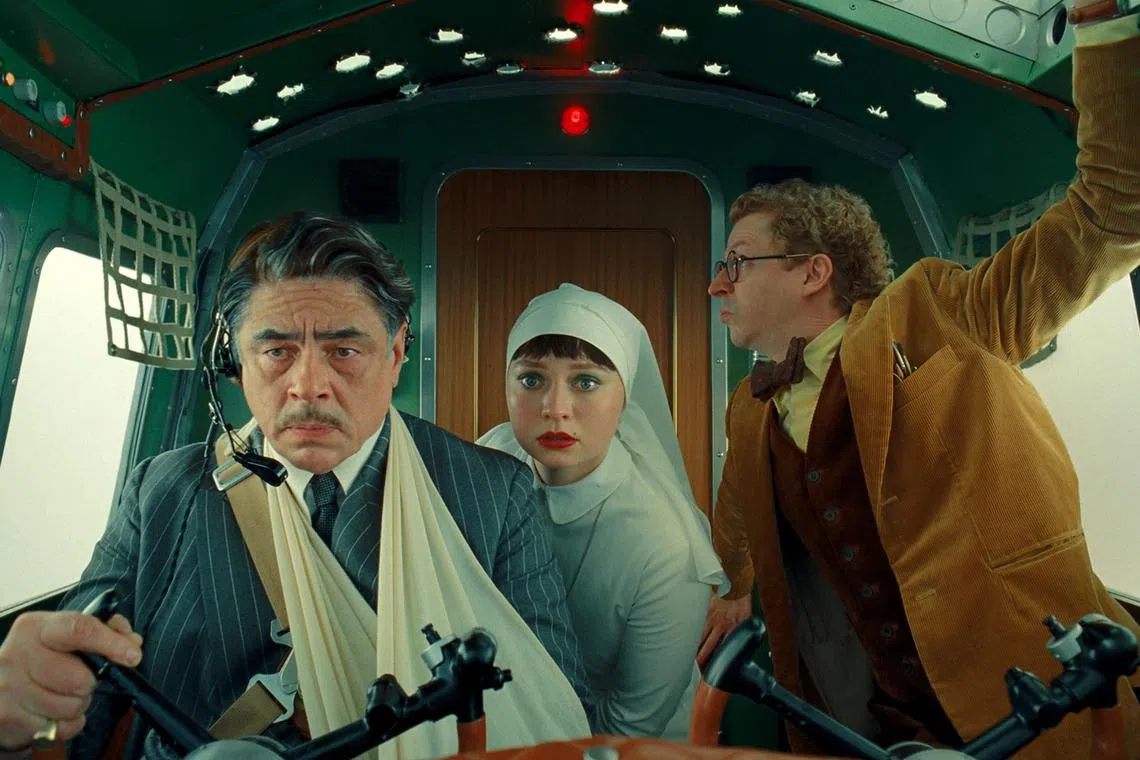At The Movies: The Phoenician Scheme is a lifeless satire while The Life Of Chuck uplifts
Sign up now: Get ST's newsletters delivered to your inbox

(From left) Benicio del Toro, Mia Threapleton and Michael Cera in The Phoenician Scheme.
PHOTO: UIP
Follow topic:
The Phoenician Scheme (NC16)
110 minutes, opens on June 5
★★☆☆☆
The story: In 1950, the corrupt and internationally reviled millionaire Anatole “Zsa-zsa” Korda (Benicio del Toro) is looking to cement his legacy with a massive construction project in the nation of Greater Independent Phoenicia. However, the tycoon is beset by those seeking his downfall, among them various governments, members of his family and business partners he has betrayed. After surviving a plane crash – the latest in a string of assassination attempts – Korda reconnects with his convent-raised daughter Liesl (Mia Threapleton), hoping that she will continue his work in case the assassins succeed. Father and daughter, accompanied by Norwegian tutor Bjorn (Michael Cera), head overseas to raise money for the project.
When billionaires today get nostalgic about returning the world to a Golden Age, they are thinking about the time when the ultra-rich did the things they do today – sire offspring by as many women as they can, topple and install governments, build empires on the backs of forced labour – but without the annoyance of officials carping about alimony, child support or paying workers a living wage.
Korda is American film-maker Wes Anderson’s cartoonishly exaggerated version of the 1950s tycoon. The scoundrel has fobbed off his many children to a dormitory that houses them in pauperish conditions. A few of his former wives have died under mysterious circumstances, including Liesl’s mother. He cares nothing for his kin. All he worries about is his legacy, the project of the film’s title.
This is Anderson’s most political film since the Oscar-winning The Grand Budapest Hotel (2014), which used a fictional setting to explore the real consequences of 1930s fascism.
Greater Independent Phoenicia might also be fake, but men like Korda were real, as were his equally wealthy and ruthless associates – Leland (Tom Hanks), his brother Reagan (Bryan Cranston) and Marty (Jeffrey Wright) – each representing an aspect of 1950s crony capitalism of the kind that secured monopolies in mining, shipping and industry in the wake of post-war decolonisation.
Also lovingly lampooned are the movements that rose in response to men like Korda. British comedian and writer Richard Ayoade is Sergio, a Marxist rebel seeking to derail Korda’s pet project, and Scarlett Johansson is Cousin Hilda, hoping to establish a kibbutz-like utopia in the desert.
Despite some funny jokes and clever slapstick, it all feels like an arid exercise in moving chess pieces around a beautifully decorated board. Fine performances by Threapleton and del Toro breathe some humanity into the story, but even they cannot overcome the feeling that The Phoenician Scheme is a trip to an art gallery featuring mid-century aesthetics and not much more.
Hot take: Anderson’s visually gorgeous but cartoonish satire of post-war power and legacy takes a cool, distant view of a subject that deserves a more emotional assessment.
The Life Of Chuck (NC16)
111 minutes, opens on June 5
★★★☆☆

Tom Hiddleston in The Life Of Chuck.
PHOTO: SHAW ORGANISATION
The story: Best-selling American author Stephen King co-scripted this adaptation of his 2020 novella about an everyman named Charles Krantz (Tom Hiddleston).
The Life Of Chuck opens into a world of deluges, wildfires and mass suicides. The internet then crashes in the surest indication of the end times.
A schoolteacher (Chiwetel Ejiofor) and a nurse (Karen Gillan) are a divorced couple seeking connection, while puzzling at the sudden proliferation of billboards around their American town congratulating what looks like Marvel Cinematic Universe antagonist Loki on his retirement after “39 great years”.
Charles “Chuck” Krantz is this accountant embodied with mild-mannered charm by British actor Hiddleston. Three chapters will narrate in reverse his orphaned childhood (wonderfully played in succession by Benjamin Pajak, Cody Flanagan and Jacob Tremblay) with his grandparents (Mia Sara and Mark Hamill) to his death at age 39 from cancer, back at the movie’s start.
The universe is a manifestation of his lived experiences, and its accelerating obliteration of his relationships, memories, every moment of sadness and joy, including an exhilarating impromptu promenade dance to a busker’s (played by American dummer The Pocket Queen) drum: This seven-minute centrepiece has gone viral for Hiddleston’s fabulous footwork.
Here is the humanist King of Stand By Me (1986) and The Shawshank Redemption (1994), rather than the touted “King of Horror” of American producer, director and writer Mike Flanagan’s previous King adaptations – Gerald’s Game (2017) and Doctor Sleep (2019).
The two constant collaborators are a match in creative sensibilities. Grandpa’s haunted attic aside, the only supernatural pondered in their thoughtful and unexpectedly touching metaphysical fable is the wonder of life, even one as ordinary as Chuck’s.
Hot take: Soppy? Sure. But this uplifting tale on the fullness of the human existence is completely without cynicism. Whang Yee Ling

